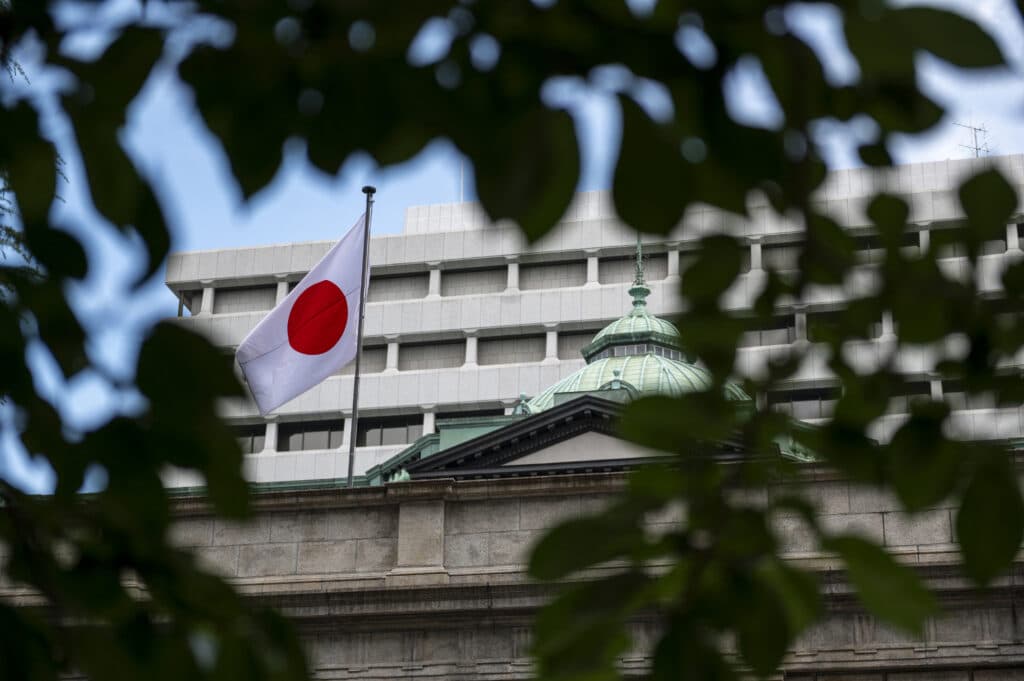
The Japanese national flag is seen at the Bank of Japan (BoJ) headquarters in Tokyo on July 31, 2024. (Photo by Kazuhiro NOGI / AFP)
Updated on July 31, 2024 at 3:35 p.m.
Hong Kong, China — The yen rose against the dollar Wednesday after Bank of Japan hiked interest rates for the second time in 17 years, while equity markets climbed on growing hopes for a cut in US borrowing costs.
Crude prices surged on worries about an escalation in the Middle East after Hamas said its political leader was killed in an Israeli air strike in Iran.
After more than a decade of pursuing an ultra-loose monetary policy to kickstart the stuttering economy and flatlining inflation, the BoJ has this year shifted its focus as prices continue to rise at rates above the bank’s target.
READ: US consumer confidence edges up in July
That saw a lift in March to around zero to 0.1 percent — the first hike since 2007 — marking a shift away from a long-running campaign of negative rates.
Wednesday’s decision put them at 0.25 percent.
Bets on another BoJ increase had surged in recent days, pushing the yen to 152.12 to the dollar and putting the currency on course for its best month in a year and a half.
“While historically the BoJ have been known to disappoint, this time the policy changes have met the mark and should be seen as a show of confidence and a message that they see economics in a strong enough position to absorb a lift in the cost of capital,” said Chris Weston at Pepperstone Group.
However, officials have had to tread a fine line as the economy remains fragile.
Many commentators had predicted the bank would stand pat this month, but Japan’s newly appointed top foreign exchange official said the benefits of a weaker yen were outweighed by the demerits.
“While the recent depreciation of the yen has both advantages and disadvantages, the demerits are becoming more noticeable,” Atsushi Mimura told Bloomberg in an interview Monday, pointing to higher energy and food prices as well as the effect on importers.
The yen’s advance comes just weeks after the unit hit a nearly four-decade low close to 162 at the start of July. Higher rates push up government yields, making assets more attractive to anyone looking for better returns.
Before the announcement Stefan Angrick at Moody’s Analytics warned that at best a small increase would be an added drag, and at worst “it would tip the economy into recession and precipitate broader financial market disruptions”.
READ: PSEi falls below 6,700 as investors pocket gains
However, Hiroshi Namioka at T&D Asset Management was less concerned, saying ahead of the announcement he thought BoJ boss Kazuo Ueda “wants to expand the scope for lowering policy rates for the future”.
He said the impact of an increase “on the real economy, such as consumption and capital investment, will be limited. In fact, unless the policy interest rate is raised, inflation may not slow down in the future due to a rise in import prices.
“My view is that consumption is not growing because inflation has not slowed down and real wages are stagnant. Some politicians are also becoming aware of this issue.”
He also raised the fact that the Fed’s September meeting in September would come before the BoJ’s, which could make it harder to lift then.
“The timing of this (July) interest rate hike is probably appropriate,” he said.
The prospect of higher borrowing costs had weighed on the Nikkei in the morning but it bounced back soon after the announcement and finished more than one percent higher after Ueda said more hikes would be data-dependent.
The rest of Asia also advanced, with optimism running high that while the Fed will not cut rates later in the day, it is now in dovish mode and will tee up a reduction at its next gathering.
There is also talk of at least one more before the end of the year.
Hong Kong, Shanghai advanced helped by hopes for more policy support from Chinese authorities following another weak batch of data on factory activity.
Sydney, Seoul, Singapore, Mumbai, Wellington, Bangkok, Manila and Jakarta also rose, while London, Frankfurt and Paris opened sharply higher.
Dealers brushed off news that Microsoft saw an increase in quarterly profit but its key cloud computing unit fell short.
That came after results last week from Tesla and Alphabet missed forecasts, fuelling concerns about the titan tech firms that have led a rally in markets this year.
More reports are due this week from fellow market heavyweights Apple, Amazon and Facebook-parent Meta.
Oil prices rose more than one percent after Hamas said its political leader, Ismail Haniyeh, was killed in an Israeli strike in Tehran, fanning fresh concerns about a wider conflict in the crude-rich Middle East.
A senior Hamas official warned that the killing was “a cowardly act and will not go unanswered”.
The killing came after Israel on Tuesday struck a Hezbollah stronghold in southern Beirut, killing a senior commander of the Iran-backed group it said was responsible for a weekend rocket attack on the Israel-annexed Golan Heights.
Key figures around 0810 GMT
Dollar/yen: DOWN at 152.50 yen from 153.09 yen on Tuesday
Tokyo – Nikkei 225: UP 1.5 percent at 39,101.82 (close)
Hong Kong – Hang Seng Index: UP 2.0 percent at 17,342.32
Shanghai – Composite: UP 2.1 percent at 2,983.75 (close)
London – FTSE 100: UP 0.9 percent at 8,352.44
Pound/dollar: UP at $1.2840 from $1.2832
Euro/dollar: UP at $1.0824 from $1.0813
Euro/pound: UP at 84.30 pence from 84.24 pence
West Texas Intermediate: UP 2.1 percent at $76.28 per barrel
Brent North Sea Crude: UP 1.9 percent at $80.11 per barrel
New York – Dow: UP 0.5 percent at 40,743.33 (close)
dan/mtp

